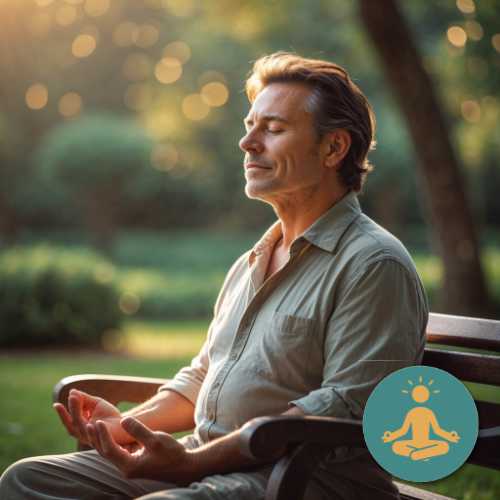Myth-Busting the Mind:
What Stillness Really Looks Like
Common Mind-Body Myths
- “Older people need less sleep.”
False. Most still need 7–9 hours; they just may wake more frequently. - “Meditation means thinking of nothing.”
Misleading. Meditation can include breath awareness, guided visualization, or even walking. - “If you’re anxious, calming music won’t help.”
False. Studies show soft instrumental music can lower cortisol and ease tension. - “You have to meditate for at least 30 minutes for it to count.”
False. Even 3–5 minutes can benefit the nervous system. - “You should wake up before sunrise to be truly healthy.”
Depends. If you’ve slept well and feel rested, that’s more important than the hour.
In today’s world of wellness advice, it’s easy to get confused by conflicting messages. Some claim five hours of sleep is enough, others say true meditation means clearing your mind completely. There are rules about what time to wake up, how long to sit quietly, and whether listening to music helps or hinders inner peace. But the human mind and spirit are more nuanced than any one-size-fits-all solution.
Let’s begin with sleep. A common belief is that older adults don’t need as much sleep. In reality, sleep needs remain fairly constant throughout life—about seven to nine hours per night for most adults. What changes with age is often sleep quality, not the body’s need for rest. If anything, aging makes nourishing the shen (神)—the spirit—more important, and poor sleep can be a sign that spirit and heart are out of sync.
Then there’s meditation. How long should you do it? Must you clear your mind? These questions often create more tension than tranquility. In traditional Chinese practices, meditation isn’t always about emptiness. In Daoism, it might mean “sitting and forgetting” (坐忘 zuò wàng), while in other traditions it could mean visualizing light, focusing on breath, or simply pausing before reacting. Five minutes of sincere stillness can be more beneficial than 30 minutes spent worrying whether you're doing it right.
Music is another area full of misconceptions. While silence is powerful, music—especially when it’s calming and gentle—can help quiet the heart and guide the emotions. Classical Chinese instruments like the guqin (古琴) were traditionally played to refine emotion and support inner stillness, not just for entertainment.
In all of this, what matters most is alignment. Are your habits bringing harmony to your mind, body, and spirit—or adding pressure to perform wellness “correctly”? Your tea moment doesn’t need perfect posture. Your meditation doesn’t need to be wordless. Your sleep doesn’t need to follow a strict schedule if it leaves you calm and rested.
There’s no gold medal for enlightenment. The work of tending to the spirit is less about mastering technique and more about learning to listen—to your breath, your heart, your mood, your needs. And in that gentle attention, myths begin to dissolve on their own.
Vocabulary Guide
- Shen (神): The spirit or consciousness, associated with the heart in TCM.
- Zuò wàng (坐忘): “Sitting and forgetting,” a Daoist term for entering meditative stillness.
- Guqin (古琴): A traditional seven-string Chinese zither used for self-cultivation.







